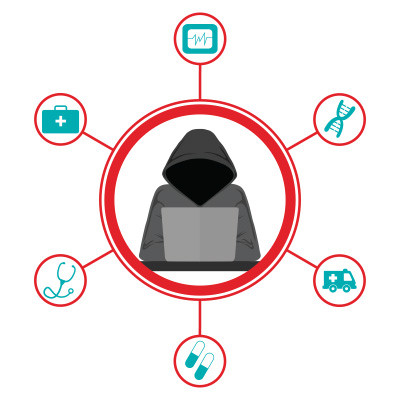Home
About Us
IT Services
Understanding IT
- Understanding General Data Protection Regulation Compliance
- Understanding Automation
- Understanding Ransomware
- Understanding Shadow IT
- Understanding Your Virtual Identity
- Understanding the Modern Office
- IT Threat Glossary
- Understanding Business Continuity
- Windows Server 2003: End of Life
- Understanding the Internet of Things
- Understanding Network Security
- Understanding SOX
- Understanding BYOD
- Understanding PCI DSS
- Windows XP End of Life
- Understanding HIPAA
- Cloud Computing
News
Blog
Support
Contact Us
(713) 979-2090
- Register
- Login
Zinc Blog
Healthcare Information is the Most Valuable Data to Cybercriminals
Hackers and scammers are everywhere and are continuously littering your business with situations that could put its operations in jeopardy. One of the most hacked industries is healthcare, as hackers make a point at going after patient information. Let’s go through some of the reasons why hackers find health data so attractive.
Inflated Market Value
Health data possesses immense value on black markets due to its potential for exploitation. Personal health information, such as medical records, insurance details, and prescription data, can be sold for significant sums of money. Hackers are well aware of this demand and target health data as a means of financial gain.
Comprehensive Personal Profiles
Health data provides a treasure trove of personal information, enabling hackers to build comprehensive profiles of individuals. By combining medical history, genetic data, lifestyle choices, and other health-related information, hackers gain an in-depth understanding of a person's vulnerabilities and habits. This knowledge can be exploited in various ways, such as targeted phishing attacks or identity theft.
Identity Theft
Health data breaches can lead to identity theft and subsequent financial fraud. By gaining access to medical records, hackers can impersonate individuals to fraudulently obtain medical services, prescription medications, or commit insurance fraud. The repercussions for the victims can be severe, including financial loss, damaged credit, and compromised medical treatment.
Blackmail and Extortion
Health data often contains sensitive and private information that individuals would prefer to keep confidential. Hackers recognize the potential for blackmail and extortion by threatening to expose personal health conditions or treatments. This can have devastating consequences, particularly for public figures or individuals in sensitive professions.
Stymieing Medical Research and Development
The theft of health data can hinder medical research and development efforts. Researchers rely on accurate and secure health data to develop new treatments, understand disease patterns, and improve public health. When hackers compromise health data, the integrity of research is compromised, potentially delaying vital medical advancements.
Healthcare Has a Lack of Security
Healthcare organizations are often targeted by hackers due to their comparatively weaker cybersecurity measures. The focus on patient care sometimes takes precedence over investing in robust security systems, creating vulnerabilities that hackers exploit. This lax security posture makes health data an attractive target for cybercriminals.
Extensive Data Retention
Health data is typically retained for an extended period, often indefinitely. This prolonged retention increases the chances of unauthorized access by hackers over time. The longer health data is stored in computing constructs with little security, the more opportunities hackers have to exploit vulnerabilities and gain access to sensitive information.
Make no mistake about it, it doesn’t matter what industry you are in, hackers are after access to your network. If you would like help putting together a cybersecurity policy that works to keep these bad actors off your network, give the IT security professionals at Zinc a call at (713) 979-2090.
About the author
Zinc has been serving the Texas area since 2017, providing IT Support such as technical helpdesk support, computer support, and consulting to small and medium-sized businesses.
- You are here:
- Home /
- Blog /
- Zinc IT Team /
- Intro to Your Tech: Wi-Fi Calling


Comments